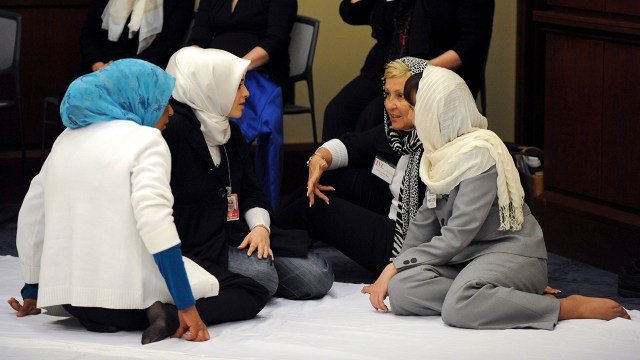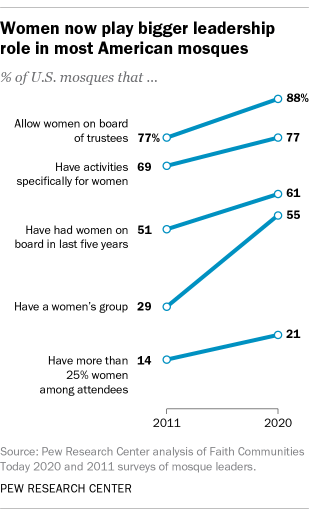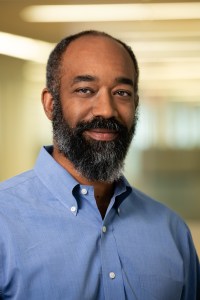
Women continue to be less involved than men in mosque life in the United States, but the pattern appears to be changing, according to a recent survey of American houses of worship.
The share of mosques in which adult women account for more than a quarter of all attendees at the Friday Jumah prayer service grew between 2011 and 2020, according to the new study, conducted by Ihsan Bagby, an associate professor of Islamic studies, as part of the 2020 Faith Communities Today (FACT) study. Women represented more than a quarter of attendees at just 14% of U.S. mosques in 2011, a share that rose to 21% of mosques by 2020.
Pew Research Center conducted this analysis about the role of women in U.S. mosques, using data collected by the Cooperative Congregational Studies Partnership as part of the Faith Communities Today (FACT) study on American religion and congregational life. The American Mosques 2020 Study data was collected in two phases. The first phase was an effort to identify all mosques in the United States, which was conducted from June to November 2019. This process identified 2,769 mosques. Leaders from a sample of these mosques (470 in total) were then interviewed by telephone. The U.S. Mosques Study 2011 followed a similar two-phase design, spanning February 2010 to November 2011, including interviews with 524 mosque leaders. Other data in this analysis is from previously published Pew Research Center reports.
Despite the increase, men continue to account for the vast majority of attendees at Friday prayer services at most U.S. mosques. Men make up the majority of Jumah prayer attendees in 94% of mosques, and there were no mosques in which men make up fewer than three-in-ten attendees at Friday prayer. The survey also found that while 44% of mosques have no children at the Friday prayer service (which typically happens during the school day), children were present in 55% of mosques.
The relatively small share of women among Friday mosque congregants aligns with results from previous Pew Research Center surveys of Muslim American adults. The Center’s most recent study, conducted in 2017, found that Muslim women were less likely than men to attend religious services at a mosque each week (37% vs. 48%), and less likely to say they were satisfied with the quality of mosques where they live (67% vs. 78%) – despite being no less likely to pray all five daily prayers (45% vs. 39%).
At least in part, this may reflect a traditional understanding among many Muslims that attendance at the Friday services is required of men but not women. Indeed, around the world, Muslim men are often much more likely than Muslim women to say they regularly attend mosque, even though there is no such gender gap when it comes to frequency of prayer or the self-described importance of religion in Muslims’ lives in most countries surveyed.

Though women make up a relatively small share of the attendees at Friday prayer services, the new FACT study found that most U.S. mosques (55%) have a dedicated women’s group, and roughly three-quarters (77%) have activities or programs specifically for women. On both of these measures, mosques’ efforts have grown since 2011. At that point, only 29% of mosques had a women’s group, and seven-in-ten (69%) had activities or programs specifically for women.
Women also have been gaining more representation on mosque boards. About nine-in-ten U.S. mosques (88%) allow women on their board of trustees (or a similar administrative body), and 61% say that women have served on the board at some point in the last five years. By comparison, a decade ago about three-quarters of mosques (77%) allowed women to serve on their board of directors, and only about half (51%) said that women had served in the last five years.



